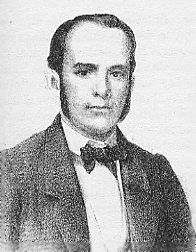2.1.14.1 José Fornaris (1827 – 1890) and his work “Cantos del Siboney”

José Fornaris, although not known for the aesthetic quality of his works or for their conceptual or sentimental depth, has among his merits the author of what many consider the most important book of the nativist poetic movement: “Cantos del Siboney”, which was very well received by the public, even described by Ambrosio Fornet as the first Cuban best-seller.
His poetry follows the course of the Romantic movement. The artificial rhetoric of the early period, along with a sometimes unsubstantiated ease of verse, is evident in his poetic works; though he eventually sheds these elements and achieves a simplicity of expression closer to the second Romantic generation.
He was a prolific poet and fortunate enough to establish himself in popular taste, but his adaptation to the established literary norms, his pronounced facileness in verse construction, and the lack of depth in the analysis that precedes the lyrical synthesis of the themes he addressed, many of them of social interest, do not allow him to be described as a major poet, although the last word is never said due to the very obsolescence of the “aesthetic lenses” used to make literary judgments.
In addition to these considerations, within the framework of his work one can find pieces that constitute true oases in the sand of mediocrity:
“Come, I know the unknown route
Under splendid and shady foliage,
Beside the waters of a copious torrent
A hidden cave.
Here calm and mystery attract,
The light goes down through cracked mouths,
And like pearls from the hard rocks
Clear drops fall.
You who burn in the flames of my eyes,
You who raise me to a thousand worlds of splendor
You, siboneya who lights up my night
Listen to me, don’t be late.”
Eroticism permeates many of his works, in which he also considered women and their inferior position in society, without establishing himself as a staunch defender of their rights. The very fact of having cultivated the nativist movement and his recovery of the Aboriginal universe as a defining element of Cuban culture merits his inclusion in our literary repertoire. It is worth quoting the last stanza of his poem “The Muse,” included in the aforementioned book:
“If a worthy name in your country
Reach your lyre try
Sing the bloody story
From the aboriginal grey.
Weave the Indian martyrs
A funeral wreath,
The harp vibrates and sings
The “Songs of the Siboney”
The poem’s driving force is the idea that the poet must seek his muse in the reality of his present and past homeland. It is significant how Fornaris’s Siboneyism, by tracing its roots back to the founding roots of the nation, which stem from the painful experience of exploitation and the truly “savage” treatment received by the Aborigines at the hands of the Spanish conquistadors, pays tribute to anti-Spanish sentiment and the adoption of a political position with which he remained quite consistent throughout his life, while skillfully avoiding direct contradictions and conspiratorial situations.
This expressive line of denunciation can be traced in his work, with the mention of the “Indian martyrs” and another of his poems, “To the Martyrs,” which condemns the execution of medical students. Fornaris is one of our forgotten poets, whose work, although it did not achieve a firm place in Cuban literature, features some landmark pieces, and this one is a precursor in terms of the recovery of autochthony.








